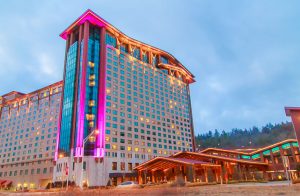The U.S. House of Representatives Subcommittee for Indigenous Peoples held a hearing last Thursday regarding disputed tribal land in North Carolina. The land is roughly 17 acres and is located in Kings Mountain off of Interstate 85 near Exit 5. It has been hotly contested by claims from both the Catawba Indian Nation and the Eastern Band of Cherokee Indians. The Catawba Indian Nation looks to move forward with a proposed casino project on the land once the dispute is settled.
The Issue
In March of 2020, the U.S. Department of the Interior decided to place the disputed land in a trust so that the Catawba Indians could develop their casino. In mid-September, Representative G.K. Butterfield, a Democrat of North Carolina, introduced the Catawba Indian Nation Lands Act (H.R. 8255). The Act would serve to reaffirm the U.S. Department of the Interior’s ruling.
Catawba Chief Bill Harris and the Mayor of Kings Mountain, Scott Neisler, testified at the hearing as supporters of H.R. 8255. In addition, the principal chief of the Eastern Band of Cherokee Indians, Richard Sneed, appeared and spoke before the subcommittee in opposition to the Act. The crux of both side’s arguments is a historical claim to the land on which the casino is to be built. The fact that the land has been put aside specifically for the development of a casino also breaks historical precedent where Native American land disputes are concerned.
The Hearing
At the hearing, both proponents and opponents of the Act were questioned by members of the House Subcommittee including Subcommittee Chair Rep. Ruben Gallego from Arizona, Rep. Deb Haaland of New Mexico, and Rep. Paul Cook from California. North Carolina Rep. Mark Walker has long been in opposition to the bill and took the opportunity to ask some probing questions of Chief Harris. Namely he inquired as to the unnamed developers and financiers of the project and why they remained so.
“Not only would current legislative proposals in Congress advocating on behalf of Catawba gambling interests in the Charlotte area play favorites at the expense of our state’s recognized Cherokee tribe, but the presence of an additional casino would have consequential economic impacts for many western North Carolinians who call our state home.” Walker went on, “I encourage supporters of these efforts to realign behind the already-bipartisan opposition and stand firm in prioritizing North Carolinians and the tribes that call our state home. Picking winners from other states is a bad bet.”
More Opposition
The Eastern Band of Cherokee Indians is also seeking to halt development on the project through litigation. They filed a case in federal court against the Department of the Interior seeking a preliminary injunction but were denied. That ruling lead to a groundbreaking ceremony for the project in July of 2020.
Defend NC is an organization backed by the Cherokee tribe running advertisements and public awareness campaigns aimed at building public pressure against the project. The Buncombe County Board of Commissioners voting in August opposed the project in a 6-1 vote and a further eleven members of the judiciary, on both sides of the aisle, signed their names to an opinion piece in the Asheville Citizen-Times opposing the casino project.
Next Steps
Groundbreaking for the project kicked off in July of 2020. However, the Catawba tribe must also receive approval for a class III gaming compact from North Carolina Governor Roy Cooper. The gaming compact would allow the tribe to introduce high-stakes slot machines and table games to their casino. Without the compact, the only gaming allowed on the site would be class II games such as, bingo and non-banked card games.
As of this time, the Governor’s office has not indicated how it will rule on the gaming compact. The Governor himself has expressed neither support nor opposition to the project.